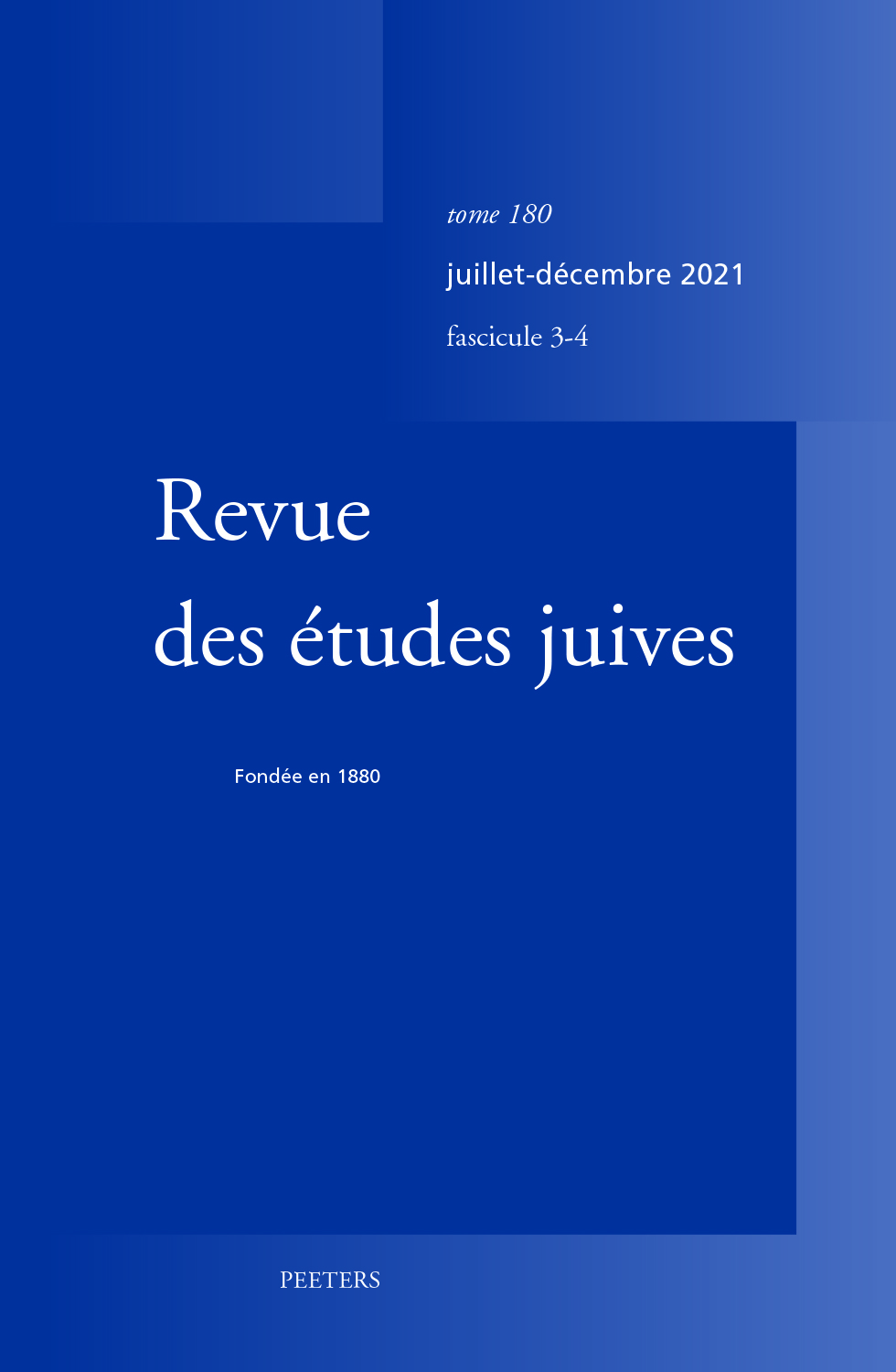 previous article in this issue previous article in this issue | next article in this issue  |

Preview first page |
Document Details : Title: Jews and Judaism in Goethe's Esthetical and Reactionary World: A Typological Study Author(s): VELTRI, Giuseppe Journal: Revue des Études Juives Volume: 162 Issue: 1-2 Date: janvier-juin 2003 Pages: 123-144 DOI: 10.2143/REJ.162.1.251 Abstract : Entre la fin du 19e et le début du 20e siècle a été publié en Allemagne un nombre d'articles et de livres sur “Goethe et le Judaïsme". Leurs auteurs étaient Juifs et Allemands, leur teneur en conséquence apologétique ou anti (philo) - sémite. Étonnamment, l'évidence indique que l'intérêt des auteurs allemands et juifs pour les vues de Goethe sur les traditions et les coutumes juives était hors de toute proportion à ce qu'avait été le vrai intérêt de Goethe pour le Judaïsme. Sa curiosité, son intérêt comme poète pour le Judaïsme sont limités aux phénomènes stéréotypés, banals, dont la plupart ont été empruntés de la littérature (chrétienne) polémique anti-juive et des loci communi. L'attitude politique de Goethe envers les Juifs et leur efforts pour l'égalité de droits civils étaient négatifs; dans son Weimar, il était en effet plus que conservateur, même réactionnaire. Déjà à peu près depuis 1840 éclata une controverse violente à propos des attitudes supposées de Goethe envers le Judaïsme. Vers la fin du 19e siècle l'atmosphère dans les cercles juifs changea. Ludwig Geiger examine les attitudes allemandes envers le “Judaïsme". Son but ouvertement déclaré était de placer le Judaïsme au cœur de la vie allemande. Vers au 1930, la lutte violente pour identifier la “vraie" culture allemande tournait au tragique. Le débat a bien sûr cessé avec la destruction de la Communauté juive allemande. Dans les années qui ont suivi la Shoah, très peu d'articles ont été consacrés au sujet. La question est s'il est peut-être embarrassant de présenter Goethe dans son contexte historique, au-delà de l'auréole poétique et esthétique. Goethe est, encore aujourd'hui, un emblème du rapport allemand-juif, caractéristique du problème d'identité culturelle. In the period spanning the late 19th and the early 20th centuries a huge number of articles and books on “Goethe and Judaism” were published in Germany. Their authors were Jews and Germans, their tenor accordingly apologetic or anti (philo)-Semitic. Astonishingly the evidence indicates that the German and Jewish interest in Goethe’s views on Jewish traditions and way of life was out of all proportion to what Goethe’s interest in Judaism had been in real life. His curiosity, his interest as a poet in Judaism is confined to stereotypical, hackneyed phenomena, most of them taken from (Christian) anti-Jewish polemical literature and loci communi. Goethe’s political attitude to Jews and their striving for equal civil rights was a negative one; in his Weimar he was indeed more than conservative, even reactionary. Already by the 1840s a violent controversy about Goethe’s supposed attitudes to Judaism was raging. By the end of the 19th century the atmosphere in Jewish circles had changed. Ludwig Geiger began a close analysis of German “canonical” literature searching for German attitudes to “Judaism.” His openly declared aim was to place Judaism at the core of German life. By the 1930s the violent struggle to identify the “true” German culture was turning into an even more catastrophic confrontation. The debate of course ceased with the destruction of German Jewry. In the years following the Shoah very few articles have been devoted to the topic. The question is whether it is, perhaps, too embarrassing to present Goethe in his historical context, beyond the poetic halo of mere aesthetics. Goethe is, even today, a symbol of the German-Jewish relationship, typos of the problem of cultural identity. |
|


